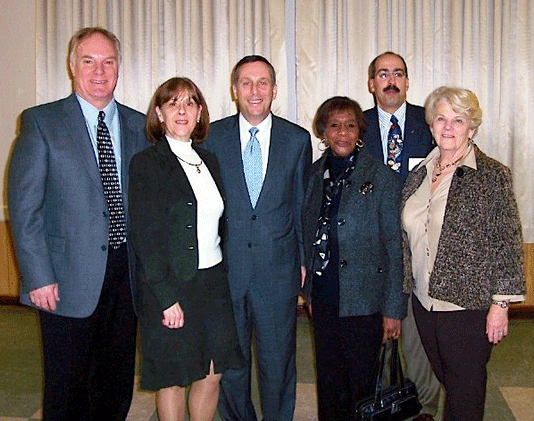Tufts President Addresses City’s Civic Clubs
Bacow: Protecting Students is Top Priority in Tough Financial Times

Tufts University President Larry Bacow was the featured speaker for the Joint Service Annual Dinner in February, hosted by the Kiwanis. Bacow, center, is pictured with several of the civic club presidents above. The following club presidents were in attendance (not all are pictured above): Gary Conserva, Kiwanis, Tony Giamberardino, Rotary, Lisa O’Loughlin, Chamber of Commerce, Mary Jo Mangan, Thursday Fortnightly, Donna Clifford, Zonta Club, and Marty Hollis, Medford Lions. Photo courtesy Carl Cincotti, Sr.
– Allison Goldsberry
Tufts University President Lawrence “Larry” Bacow was the featured speaker at the Joint Service Annual Dinner, hosted this year by the Medford Kiwanis at the VFW on February 26.
Bacow spoke about leading the university through tough economic times and connected the various civic clubs’ collective missions with that of Tufts’ own core mission of educating and graduating future public citizens.
After mixing and mingling with much of the crowd of 100 during the cocktail hour, President Bacow sat at the head table with each of the Club Presidents for dinner, after which Medford Kiwanis member and Tufts Alum, Robert White, E’69, introduced him to the crowd. Bob White also thanked Chamber member and Tufts Alum Steve Eliopoulos, A’89 of Gravity Film, Video & Digital Media for arranging to have Bacow as a guest speaker for the event. Eliopoulos is an active Tufts alum and has logged many painful miles alongside Bacow as a member of the Tufts Boston Marathon fundraiser team.
Bacow started off by thanking the various civic clubs for all that they do to better Tufts’ host community of Medford. He also pointed out what a great partner Medford has been over the years with Tufts, specifically citing Mayor Michael McGlynn’s own cooperation and partnership with Tufts.
Bacow illustrated the strength of the Tufts-Medford partnership through a story. During the infamous summer brown-out of 2002, Medford was told by the utility company that either the city could remained powered, or Tufts could- but not both. President Bacow and Mayor McGlynn talked on the phone, and Bacow volunteered to have the utility company shut down Tufts for several days, and Tufts went on generator power. Bacow said Mayor McGlynn was extremely cooperative in giving Tufts whatever they needed from the city during that time.
Medford and Tufts are connected in another important way- through their people. Many students and alums call Medford home, while the university is the city’s single largest employer.
In addition to 34 students currently attending Tufts as undergraduates (approximately 8 per class) from Medford, there are 677 Tufts alumni that live in Medford. Bacow said this is one of the benefits of a world class university in the Boston area- that students will remain in the community after attending the school. President Bacow himself grew up in the now-financially-devastated auto-city of Pontiac, Michigan and settled in the Boston area after graduating from MIT.
According to Bacow, Tufts employs several hundred Medford residents, which totals $20 million dollars in annual payroll costs alone. Tufts pays over $1 million per year in property taxes to Medford on properties such as the renovated Dame School on George Street. Tufts also has made $1.25 million in-lieu-of-tax payments to each of its host communities over the past several years. In addition, 60,000 visitors descend upon Tufts’ Medford campus to check out the school each year, and spend money on lodging, food, and recreation in Medford. Bacow said the impact of all the top Boston-area college commencements is the economic equivalent of two Superbowls every year given the influx of students and their families.
Pres. Bacow also spoke about how Tufts is being affected by the current economic challenges. Tufts’ five major sources of income are tuition, which covers less than 50% of the operating budget, interest off of the endowment, gifts and donations, government research funding, and revenue from from below-market patient services delivered at the university’s medical, dental, and veterinary schools.
According to Bacow, Tufts has lost 30% of its endowment, which has slid from $1.6 billion to about $1.1 billion, which has resulted in a decrease in working capital from interest off the endowment. Bacow noted how, ironically, richer schools such as Harvard and MIT suffer more during an economic downturn such as this because a much higher percentage of their income is derived from their endowments. Bacow said Tufts has been “OK” in this regard and the tuition increase for 2009-2010 is the smallest one in many years at Tufts.
Layoffs at Tufts have been minimal and while salaries have been frozen, hiring has not completely been frozen. Bacow said Tufts is still hiring teachers where needed. Tufts has cut $36 million from its operating budget in just about every department and line item except for financial aid. Bacow said protecting its students is Tufts’ number one priority, to which he received loud applause from his audience.
Bacow explained how Tufts has been “needs blind” in practice by its own volition for the past two admissions cycles, meaning the Admissions Office doesn’t consider an applicant’s financial need until he/she is accepted. The goal someday, Bacow said, is for Tufts to be needs blind by actual policy, not just by voluntary practice.
Despite so many parents of students now attending Tufts who are losing jobs, homes, or both, not one single student has withdrawn from Tufts due to finances. All financial aid packages have been preserved, reworked and often increased so that the student may remain in school. This remark was met by resounding applause.
Following his speech, President Bacow fielded questions from the audience, many of whom took the opportunity to ask Bacow, who is an economist and lawyer, how he personally felt about the government bailout package and the plight of the auto industry, among many other questions.